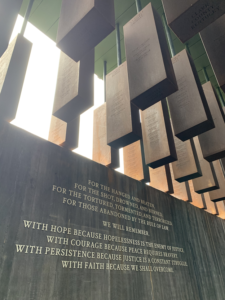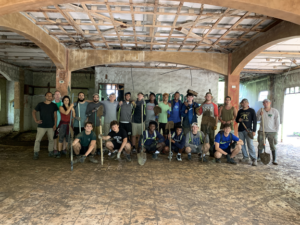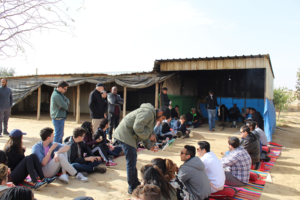Grace of Empire
My childhood was split between the United States and India. All too often, the heated debates at my grandparent’s teak dinner table in Panchkula would contrast my friends’ lunch table blusters of North American exceptionalism. I learned to see more in the world that way than what I had heard or read in the classroom. In the times since, I’ve been fortunate enough to speak with Palestinian freedom fighters, Knesset officials, and Bedouin travelers, work hand-in-shovel with the people of Los Munos, Nicaragua, and learn under some of the brightest legal minds on jurisprudence and international human rights at the University of Oxford.
These international experiences highlighted part of what makes the United States so special — a nation where one’s voice can make a true difference and one’s immigrant parents can inspire their child to reach for the Ivy League; a travesty where race relations occupy an unresolved, tormented place in the American psyche coupled with the deeply misguided, structural insecurities that have separated migrant children from families and enabled evil to profit off generational incarceration; and a wonder where bets on capitalism’s bravado turned around a global pandemic’s vaccine in record time and gave home to some of the world’s most innovative minds. With deep reverence for the privileges of my homeland, I have come to appreciate — and more often criticize — the American Empire.
Yet, as over 300,000 Americans have died from COVID-19, the darkness of winter looms large for an empire in decline. The United States has retreated from international leadership, while the fabric of humanity’s future hangs delicately over fire, crying out for global action against climate change. We have witnessed history’s third reverse wave of authoritarianism accelerate in a global pandemic. Now, with new technologies that make it possible to monitor, follow, and neutralize dissent or protest before it takes place, the centralized, autocratic model of governance has become more competitive than ever before. If the genocidal concentration camps of over a million Uighurs and Turkic Muslims in Xinjiang are any indication, the thing we must understand about the 21st century is that human rights are far from guaranteed.
Still, a Biden-Harris Administration holds immense promise for navigating us through the unknown. I’m lucky to have started my Scoville just a few months ago at the Federation of American Scientists, an organization devoted to restoring evidence-based decision making into government. To have been in D.C. for the election was a special moment, one I will forever treasure. I couldn’t have asked for a better boss in Dr. Ali Nouri nor a more welcoming and intelligent team than the all-star group at the Day One Project.
Already, I’ve been able to work with some of the key leaders on science and technology issues and develop actionable policy for the Biden-Harris transition. I’ve also helped track the spread of Russian malware in misinformative vaccine-related articles with the Disinformation Research Group.
The project I currently lead focuses on countering digital authoritarianism by designing a responsible, liberal-democratic alternative to China’s oppressive surveillance model. It is an effort that appreciates the fact that half the world is still to gain internet access, and that, in our rivalry-partnership world, a game of norm-setting is afoot. Our motto has been that leadership in this era of artificial intelligence must proceed by example — if we are to expect the international community to deploy technology responsibly, we must first model it ourselves. So, I took to a process of interviewing 35+ stakeholders including the ACLU, Palantir, the Oakland Privacy Advisory Commission, and several police chiefs. I’m proud to say we’ve identified some creative and accessible policy solutions to usher in more democratic accountability in the use of hi-tech surveillance both at home and abroad.

At the National Memorial for Peace and Justice, the nation’s first memorial dedicated to the legacy of enslaved, segregated, and lynched people of color.
Relatedly, I am also exploring avenues to facilitate the leapfrogged development of digitizing countries into the Information Age. Imagine if the United States, European Union, and other Western democracies led the charge; it’s a chance to start building the world back better from the sins of colonialism.
Inherent to my work has been the acknowledgement that the American Empire is not what it once was — nor should we want it to be. The issues confronting the world are too immediate and too grave for any one country to tackle alone. Neither vaccine nor election will solve our ailments. In the ensuing multipolar world, democracy’s greatest test has yet to come: if we are to enter this new period with grace, we must lead by example. As citizens, we must prepare by exercising dutifully the inalienable rights to vote, speak freely and with knowledge, and organize safely — gifts far too many cannot share. As a country, we must, at a minimum, expect our leaders to move past the visible decays of polarization that have to-date prevented pandemic disaster relief. And as the world’s most powerful democracy, we must find strength in our allies. After all, if there’s one thing I learned at my middle-school lunch table it’s this: two heads are better than one.
Ishan Sharma is a Fall 2020 Scoville Fellow with the Federation of American Scientists.


